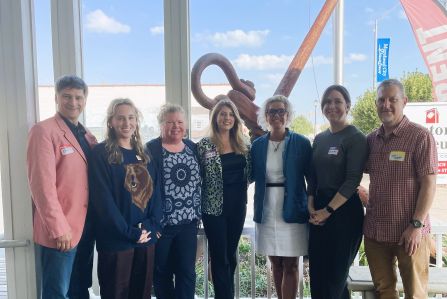
By Sabine Brüser, Project Officer at the European University for Smart Urban Coastal Sustainability (EU CONEXUS plus) and the University of Rostock Center of Digital Innovation
In 2024, North Carolina State University teamed up with Raleigh and its sister city Rostock, and the University of Rostock and its Center for Digitalization and Innovation for a project with funding from the TCB. The project, “NC and the Ostsee”, examined coastal sustainability in Rostock and in North Carolina.
Bringing together city leaders and researchers, the project offered events and seminars that provided a transatlantic perspective on topics such as the blue economy, sustainable city planning, and coastal biology and biodiversity. Even before this project, the universities and the cities could look back on various collaborations. For example, during the Innovation Festival in Rostock in October 2023, Raleigh presented its idea for a smart city in which GPS systems and radars enable driverless buses.
Through the TCB project, the University of Rostock and NC State University revived and renewed their partnership. When Amy Conger (Vice Provost for Global Engagement) and Allison Haskins (Office of Global Engagement, Global Programs Coordinator) from NC State University visited Rostock in the summer of 2024, it became clear that the two regions share many similarities in terms of their infrastructure, the climate issues they face, such as sea level rise and increasing intensity of storms, and the importance of tourism to the local economy, as well as related challenges (overtourism in some areas, cruise ships). With this background and two renowned universities, there had to be more potential for collaboration.
In those first meetings, it also became clear that the University of Rostock and NC State University have a number of research overlaps, mainly in the fields of marine science and marine engineering. Additionally, the University of Rostock and NC State University are both strongly committed to encouraging cooperation between industry and higher education, and facilitating and promoting innovative ideas and startups play a big role at both universities. A keen interest in growing and supporting a startup ecosystem is something that connects both places in the wider region as well. There is therefore plenty of common ground in terms of the kinds of topics and challenges that could produce fruitful collaborations.
It is always a good starting point when universities agree to work together – but you also need people to make it happen. My colleague, Luisa Wendt, and I therefore took the opportunity to take part and present at the Blue Economy Innovation Workshop organized by Chris Osburn at NC State University in October 2024. Along with a variety of participants, from students to stakeholders and entrepreneurs, we got an insight into the challenges facing the area around Morehead and the Outer Banks. From sea level rise, to overtourism in some areas, to convincing life-long residents that innovation can also be good, Luisa and I saw many similarities with our home region of Rostock / Warnemünde on the Baltic Sea.
This mutual understanding and our common focus on the blue economy and startups that find innovative uses for our natural resources created a sense of shared purpose. Among the many new contacts and fantastic ideas and inspiration we took home was David Eggleston and his work as the director at Center for Marine Sciences and Technology (CMAST) and Fathom Science (a spin off from NC State University). They transform ocean and atmospheric data into state-of-the-art forecasts for industries like offshore energy, shipping, and environmental conservation – a service that would also be very interesting to similar industries operating in the Baltic Sea. Like the University of Rostock, most startups and spin offs from NC State University are science-based, showcasing the research and innovation emerging from each institution, and this strengthens the case for closer collaboration on a variety of research and innovation projects in the future.
This is exactly what Chris Osburn and David Eggleston sought to build on in early 2025 when they, at different times, visited the University of Rostock. Besides meetings with their counterparts in their respective research fields, they also visited the Institution for Baltic Sea Research, the Marine Science Center (and said hello to our harbor seals), the Center for Entrepreneurship, and the Center for Digital Innovation. From their feedback, it is clear that both would like to collaborate more on different levels with our researchers and scientists here at the University of Rostock.
The TCB funding helped to strengthen existing cooperation mechanisms – but this never works unless you have engaged and enthusiastic people to bring those mechanisms to life. Despite all the uncertainties and insecurities, it is more important than ever to keep this partnership and collaboration going. Therefore, it was amazing news to hear that NC State University again received funding through the TCB to partner with Rostock – this time on a large, fall workshop examining innovation and the blue economy in Rostock and North Carolina. We’re all very excited for what this next phase of our partnership will bring!
